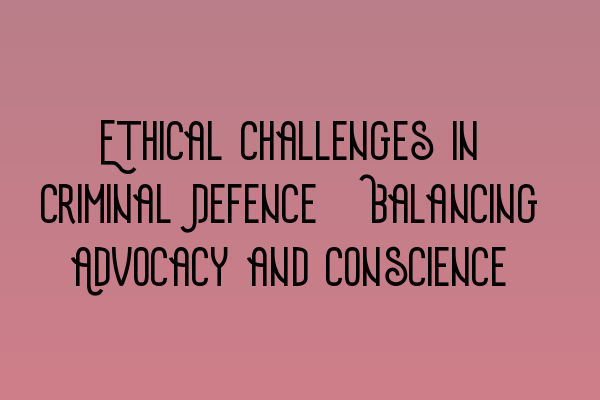Ethical Challenges in Criminal Defence: Balancing Advocacy and Conscience
As a criminal defence solicitor, you are faced with a myriad of ethical challenges on a regular basis. Upholding the principles of justice and ensuring a fair trial is no easy feat, especially when balancing the role of advocate and the tugs of conscience. In this blog post, we will explore the ethical challenges that criminal defence practitioners often encounter and how they can navigate these challenges while maintaining professionalism and integrity.
The Role of Advocacy
Advocacy is at the core of the criminal defence practice. It is the duty of a solicitor to zealously represent their client and protect their rights. This means making sound legal arguments, challenging evidence, and ensuring that due process is followed. However, advocating for a client’s interests can sometimes present ethical dilemmas.
One of the primary ethical challenges faced by criminal defence solicitors is the need to serve as a trusted advisor while advocating for their client’s best interests. This requires striking a delicate balance between aggressively representing their client’s position and maintaining professional and ethical standards.
Navigating Ethical Challenges
One way to navigate ethical challenges is by remaining steadfast in one’s commitment to justice and the rule of law. It is essential for criminal defence solicitors to uphold these principles while also serving their clients’ interests. By striving for fairness, transparency, and procedural correctness, solicitors can ensure that their advocacy is grounded in ethical considerations.
Another approach to handling ethical challenges is through open communication with clients. Solicitors should have honest conversations with their clients about the limits of advocacy and the potential ethical dilemmas that may arise. By setting clear expectations and boundaries, solicitors can minimize conflicts of interest and maintain their professional integrity.
The Conscience Factor
There are times when criminal defence solicitors may find themselves conflicted between their duty to represent their clients and their personal beliefs or moral compass. It is in these moments that solicitors must carefully assess their own values and determine how to proceed in a manner that aligns with their conscience.
While solicitors have an obligation to act in their clients’ best interests, they also have a responsibility to the court and the wider community. The ethical challenges that arise when personal beliefs clash with a client’s cause can be especially challenging. Solicitors must remember that they are officers of the court and must act with integrity, even if it means making difficult decisions.
Conclusion
Ethical challenges are an inherent part of criminal defence practice. Balancing advocacy and conscience requires solicitors to navigate complex ethical dilemmas while upholding the principles of justice and fairness. By approaching these challenges with a commitment to professionalism, open communication, and a strong moral compass, criminal defence solicitors can effectively serve their clients while maintaining their integrity.
